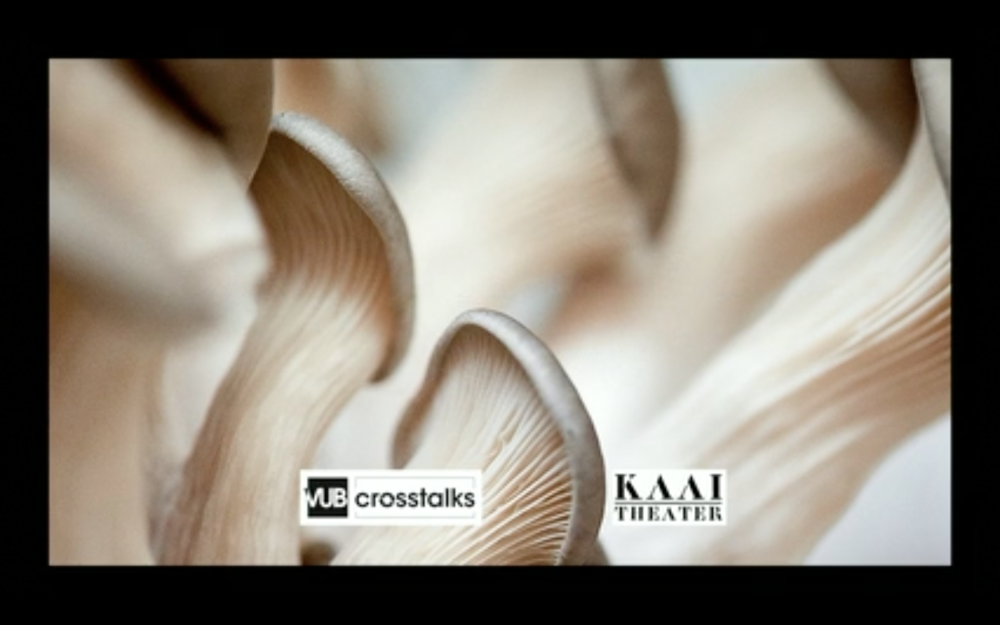THE FUNGI PARADIGM
CAMILLE BARTON, MERLIN SHELDRAKE & OLAVE NDUWANJE
A Second Series of More-Than-Human Encounters #2: recente technologische ontwikkelingen hebben de inzichten in schimmels drastisch veranderd en versneld. Ontdek de duizelingwekkende veelheid aan relaties, mogelijkheden en implicaties die schimmels vertegenwoordigen voor het leven op onze planeet.
Presented by VUB Crosstalks and Kaaitheater
Recent technological advancements have drastically altered (and accelerated) contemporary scientific insights into fungi. More and more fungi enthusiasts and scientists are seeking to re-tell our western scientific story of the origins of life in a way that does justice to the crucial role fungi play In the life of our planet. The “kingdoms” – plant, animal, insect and viral – into which this life is traditionally classical divided, are revealed to be deeply indebted to the fungi “queendom”, and interconnected in critical ways by the underground world of fungi.
The speakers uncover the dizzying multitude of relationships, opportunities and implications that fungi represent for life on our planet, and for our limited/growing body of knowledge on the intricate workings of the planet and the life it harbours. Why do fungi help trees and plants communicate to each other? Or share resources? Are fungi-based technologies the future for climate change reversal and remediation of environmental pollution? What can the networked eco-social life of fungi tell us about the successes of life on earth, about learning, problem-solving, inter-dependency, creativity, wisdom, intelligence and consciousness by non-human life. And about the way this meshes with human life? Is the network the strongest/fittest/wisest organizational formation? Do psylocibin mushrooms unlock the human animal’s limited consciousness and perspectives on life, connectivity and relation? Is consciousness amongst mammals a consequence of the prevalence of psylocibin in the natural world?
- Introduction by Goedele Nuyttens
- Video-interview with Merlin Sheldrake, author of ‘Entangled Life’
- Lecture by Eveline Peeters, microbiologist at the VUB
- Interview between Erika Sprey and Camille Barton, artist and embodiment researcher
- Discussion and Q&A with the public
• Camille Barton (they/them) is an interdisciplinary artist, educator and renegade researcher, working on the intersections of embodiment and healing justice. Camille is the head of Ecologies of Transformation (2021-2023), a temporary masters programme at Sandberg Institute, exploring how art-making and embodiment can facilitate social change. They are currently completing 18 months of research on grief with the global environments network, creating a toolkit of embodied grief rituals to support ecological solidarity work. Camille is also an advisor for MAPS, ensuring that psychedelic-assisted therapies will be accessible to communities of colour, most harmed by the war on drugs. In 2019, they project managed the Psychedelic Medicine and Cultural Trauma Workshop, a precursor to the first MDMA Psychotherapy training for therapists of colour. Camille has written for Vice, Talking Drugs, the MAPS Bulletin and Double Blind on drug policy & racial justice and speaks internationally on these topics.
• Merlin Sheldrake is a biologist and a writer with a background in plant sciences, microbiology, ecology, and the history and philosophy of science. He received a PhD in tropical ecology from Cambridge University for his work on underground fungal networks in tropical forests in Panama. He sits on the advisory boards of the Fungi Foundation and the Society for the Protection of Underground Networks, and is a research associate at the Vrije University, Amsterdam. Merlin’s research ranges from fungal biology, to the history of Amazonian ethnobotany, to the relationship between sound and form in resonant systems. A keen brewer and fermenter, he is fascinated by the relationships that arise between humans and more-than-human organisms. He is a musician and performs on the piano and accordion.
• Burundi-born Olave Nduwanje identifies as a non-binary trans femme (pronouns: she/her/hers). She is a published author, legal scholar, activist (anti-racism, LGBTQI+ rights, anti-capitalism, disability rights, anti-ecocide, etc.). Nduwanje has provided literary contributions to the following titles: Zwart-Afro-Europese literatuur uit de Lage Landen (2018), De Goede Immigrant (2020) and Being Imposed Upon (2020).

